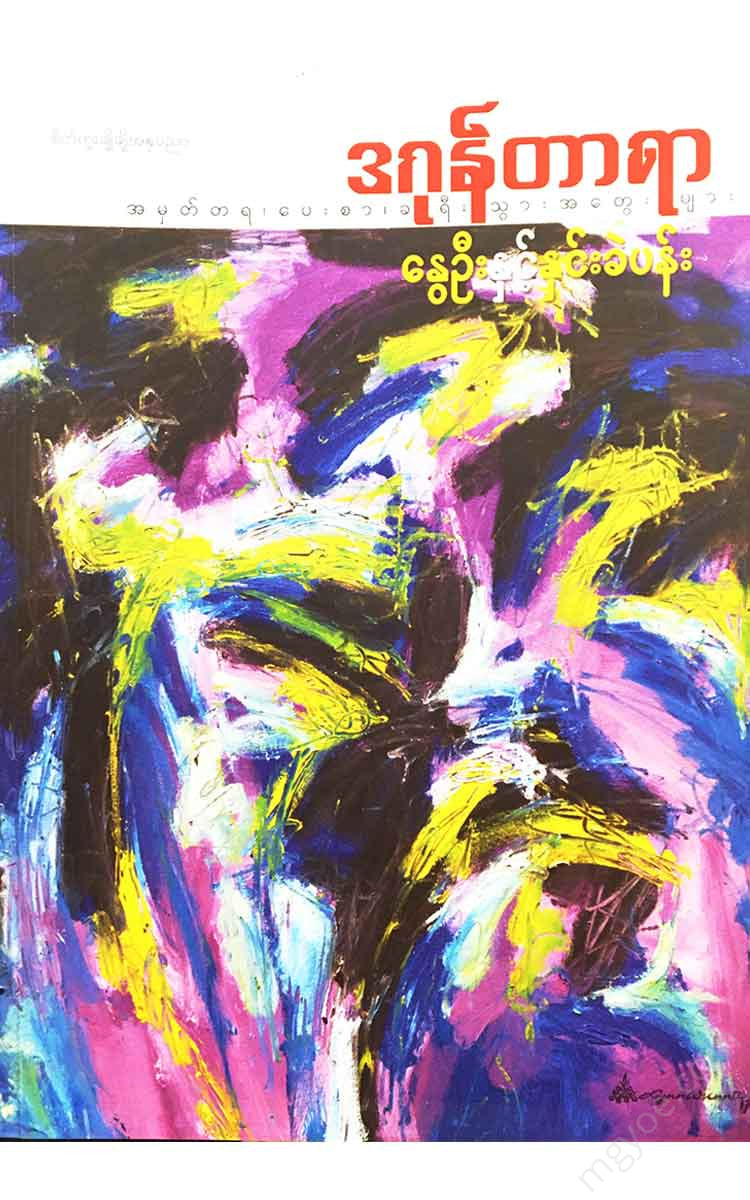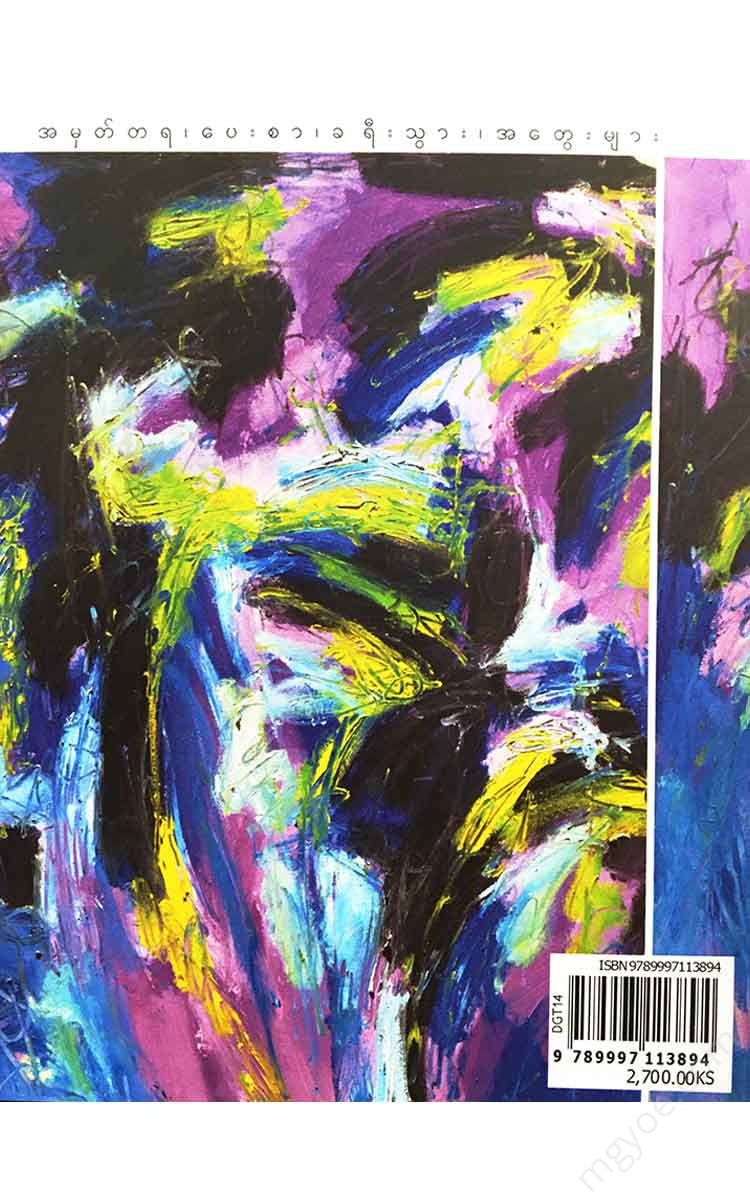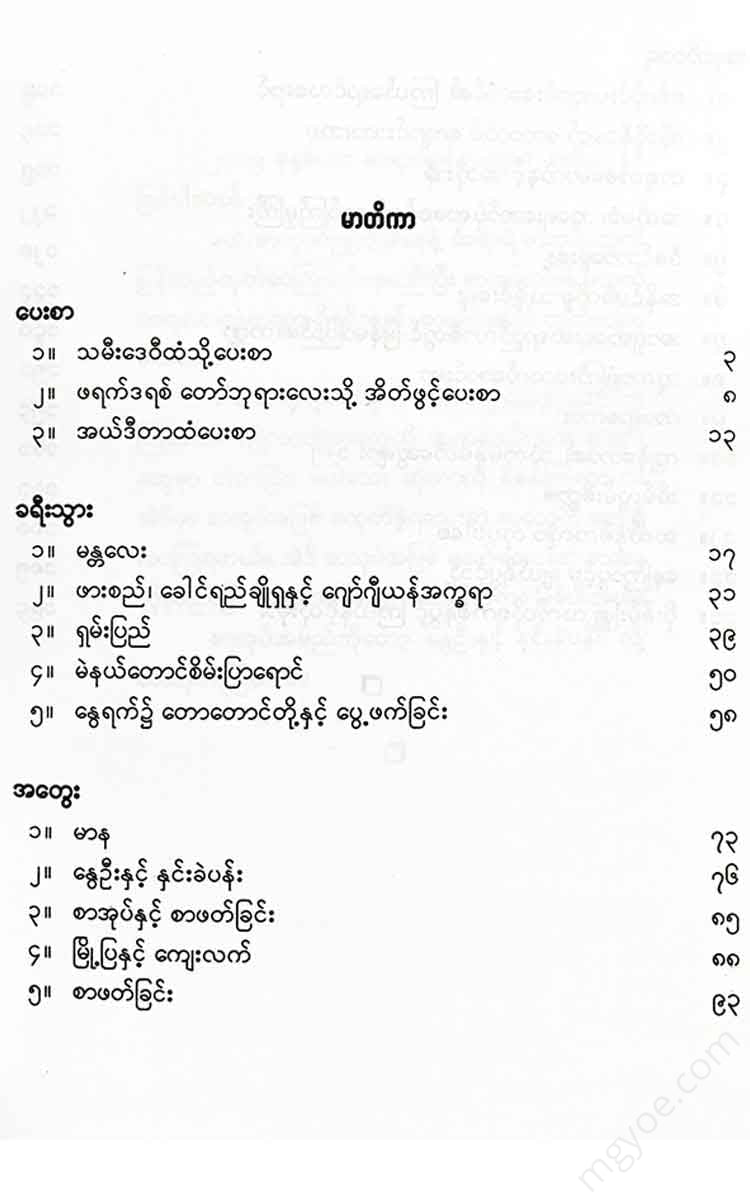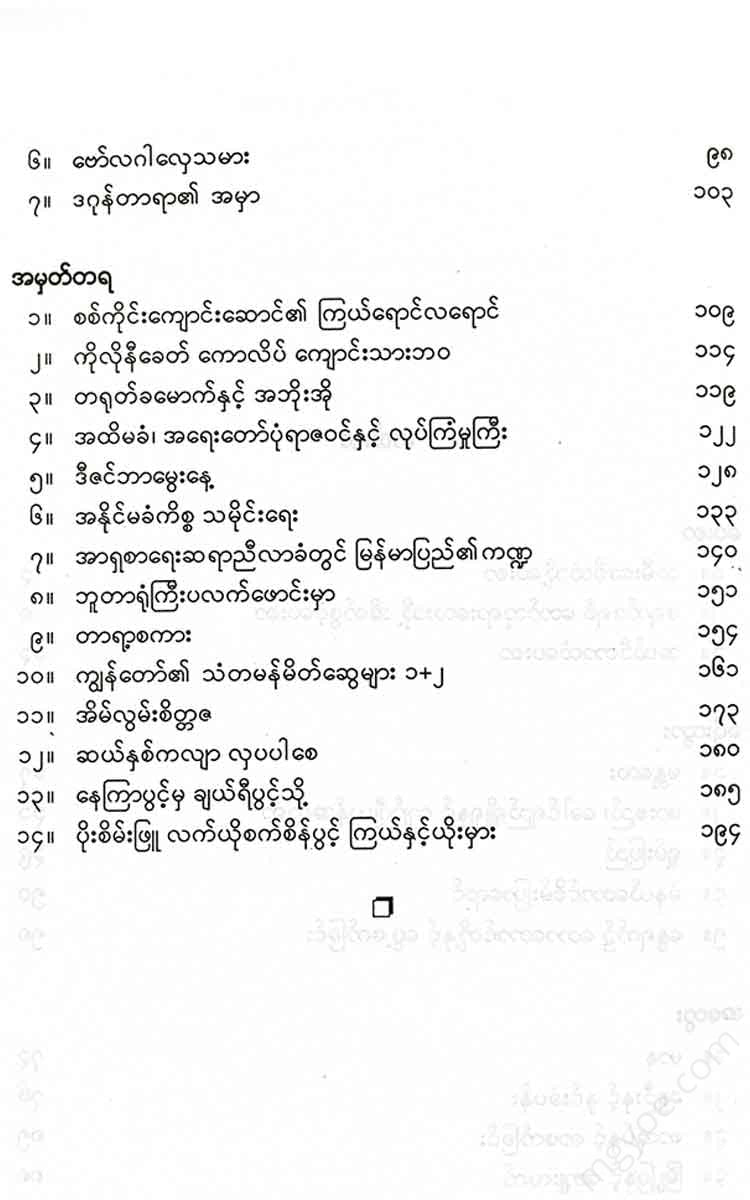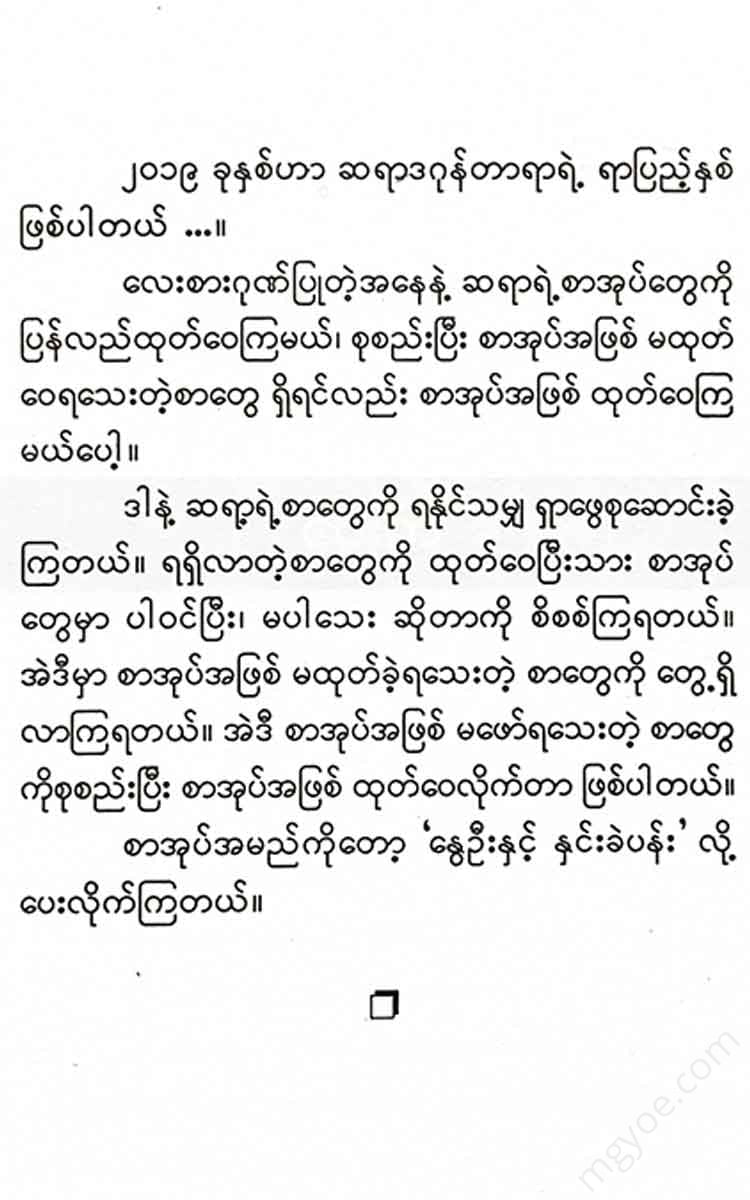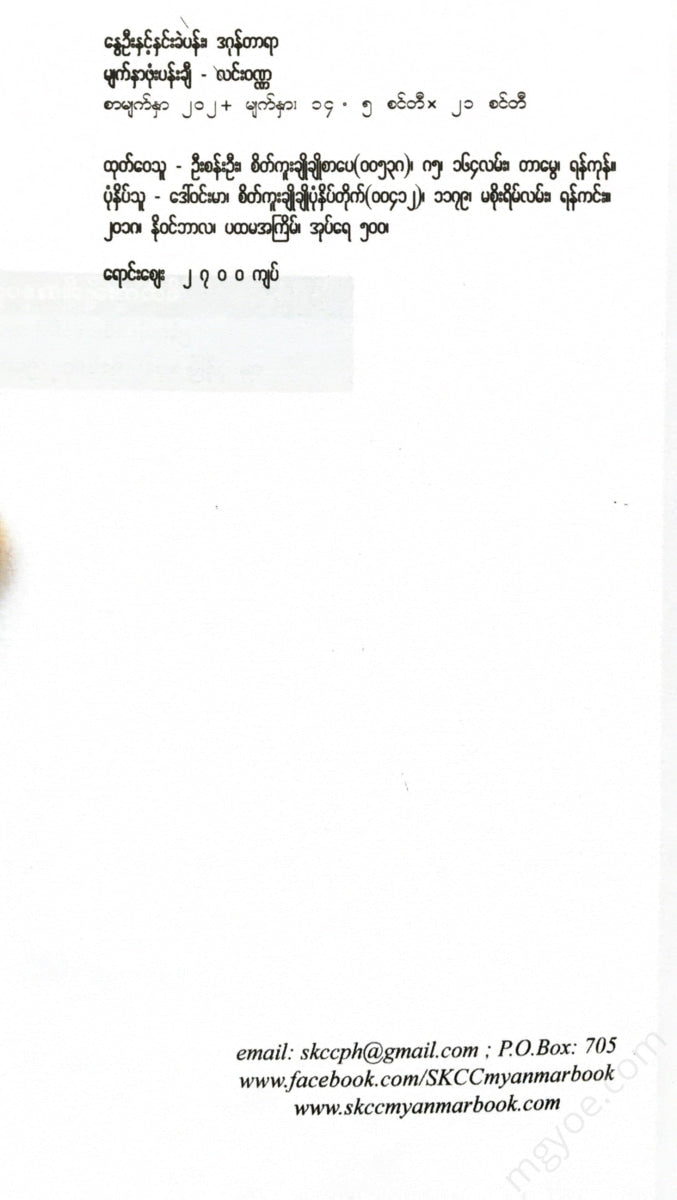စိတ်ကူးချိုချိုစာပေ
Dagon Tara - Spring and Frost
Dagon Tara - Spring and Frost
Couldn't load pickup availability
Letter to my daughter Devi
My daughter, my dear •••
I'll call you "El" as I call you at home. My grandfather doesn't often call you by your school name. People outside won't know that I'm called El. When my daughter was born, it wasn't the usual "woo" that I used to hear when she cried. "Eww." In my grandfather's ear, I just heard "Eww." So when I heard "Eww" in English, it sounded like Elwood. That's Spanish, my daughter. Wood is English. El is Spanish. That's why my grandfather called me El.
When I was in Mae Za, many people knew me as “Kuy.” Koy was what my mother called me. It was a name from the Kyawthuthu. There, I lived under the names Kuy and Kuy. Now that I am at school in Yangon, I don’t call myself any of those names. Only my family calls me that. At school, I call myself Devi.
When my daughter was born, my grandfather was not brave enough to carry her. When I started carrying her, my grandfather was shaking. There was a reason why he was not brave enough to carry her. When my grandfather was a student, he used to carry my uncle's daughter. When school was closed, my grandfather would go to my father's village, which was on the banks of the Ngawan River. It was Thasik Village. My uncle's daughter was just born, only a month old. My grandfather sat outside with his legs crossed and carried the baby. The baby fell down. It must have been because my grandfather was careless. It must have been because he didn't notice the baby moving. It was because the baby was lucky, nothing happened.
It was about 4-5 feet tall. Since then, my grandfather has not dared to carry children, he was afraid. That's why my grandfather didn't spend much time with children when he was young. He grew up with his peers. During the Japanese era, I used to carry Khin Mala. At that time, Khin Mala was about a year old. When I went to the Independence Day parade, I was struggling to carry it. It's a child's nature to learn to walk, but he doesn't want to walk. If he wants to carry it, he has to go and see it.
Another time, I lived with my grandfather's uncle Maung Sithu's children and we had to carry the children. Carrying the children was a special treat, warm and light, and it was even better. The next time we carried them was around 1960, when they were young. They were only able to carry them, even when they were 4-5 years old. They carried them until they were 9 or 10 years old. When their children came home from school, my grandfather would carry them, and I would hear them say, "Hey, their uncle carried Grace."
Then my grandfather came back from a place where the smell of sea-flu was strong, around 1960, and he was a little bit shy. He was standing up in his crib. The crib was made like a fence, so he couldn't go out. When he was sucking on a bottle, my grandfather would start. My grandfather would pull out the bottle. When he pulled it out, he would cry. My grandfather would put it back in and he would stop. He would take the bottle out of his mouth and put it back in, and he would really like it.
Now, since my daughter was born, I have been carrying a lot of weight. Now, the children that my grandfather carried have become big adults. Among them, the one who was carried at the age of 20 is a guy named Hema. He is still carrying a weight. He is a very funny guy. Even though he has grown up, he still has a child's mind.
My daughter still wants to be a model until she grows up, Grandpa knows.
Manu Yin used to write about her grandfather. My grandfather wrote about the child in the book The Little Mermaid, translated by Andersen by Am Maung. She didn't agree with my grandfather's idea. Manu Yin wrote that my grandfather didn't know about the child because he had never lived with the child. My grandfather smiled. My grandfather was very interested in children. He had lived with children for generations. That's what I wrote in the short stories of Starry Night, called The Third Generation. My daughter has read it too. It's a story based on the child's experience. It's an imaginary picture.
Grandpa didn't use the word "image" very often. He only used imaginary pictures. In them, he created imaginary pictures of the children he had passed through, such as Meimi, Chaommo-mae, Nwe Nwe, and Thiri. He was interested in children because he saw human nature. Children are simple. They act according to their own feelings and don't pretend. Studying that is like studying human nature. That's what pleased Grandpa. (Grandpa also treats children as peers. He treats them as playmates, as playmates. That way, their behavior is more obvious. The children are not afraid of Grandpa. Grandpa likes that. He likes not being afraid. That way, he can treat them as equals. That way, he can see their mentality more clearly. If they are afraid, where will they really see it? They will only see it as pretending. Grandpa thinks that children should be respected. Respect is not respect. Respect is not the same as respect. What is the difference between respecting children because they are young? They will grow up from a young age. When we study their nature, we study their developmental stage.
So, how much younger is my grandfather? He speaks to me as you and me. That shows respect. Some people, when they are a little older, speak to me as you and me. My grandfather cannot speak like that. One of my younger cousins said, “Grandpa speaks to me as you and me. Don’t speak to me as you and me, it’s rude.” I remember him saying that. He was referring to the boy who went to school with them and became a poet, yes. My uncle studies the nature of youth. It’s the same as studying the future. They will grow up, right?
The children that Grandpa raised grew up under his watch. They too chose their own paths in life. Studying them is like studying young flowers and studying human life. It is also studying the process of their development. So Grandpa thought it was a way to study the future.
My daughter is in the 7th grade now, so she's not too young in terms of education. She's not too old either. Right now, my grandfather wrote to my daughter. If you feel like reading, read it. My grandfather doesn't do it by telling her what to read and how to read.
Do you remember what Grandpa always said? Do it yourself. Grandpa didn't like being a teacher. He was very serious. He valued learning through his own knowledge more. That was real education, Grandpa understood that education meant the knowledge you know yourself. The knowledge you get from others is not real knowledge. So Grandpa often told my daughter. Do it yourself. Do it yourself. That knowledge will come. There's no need to worry.
Open your mind. Don't be constrained. If you know yourself, you will get it. I say this from experience. So I ask you, "Do I have to stay in school?" I have to stay in school. School is a training that will take you to a place where you have that knowledge. The school curriculum provides those basics. Once you have the basics, you can move up and find the truth. You have to find your own knowledge.
If there is no foundation, where can you find knowledge? The foundation is the foundation in the book, and the foundation is the foundation that you gain from experience. Only by combining the two can you continue to seek knowledge. That's why my grandfather said, "Do it with your own knowledge."
As my daughter grows up, she will understand the meaning of that phrase. My grandfather also learned it through experience.
This is a long post. I will have more to say in the next post. If your daughter is in school, she must do her homework regularly.
1-8-96
"I learned that all the letters to my daughter Devi will be compiled into a book."
